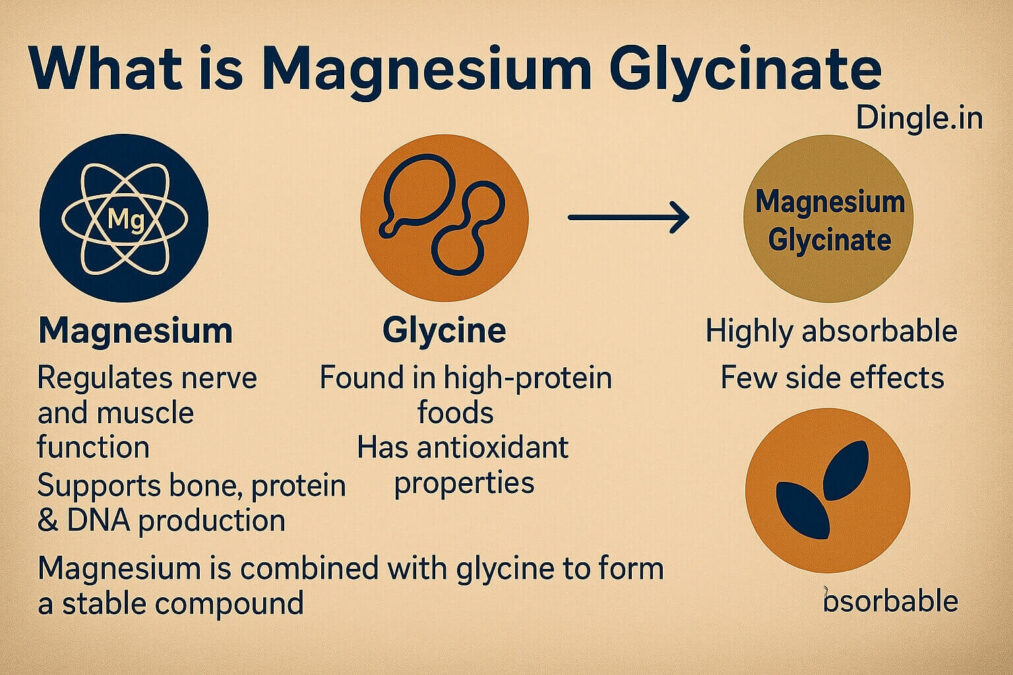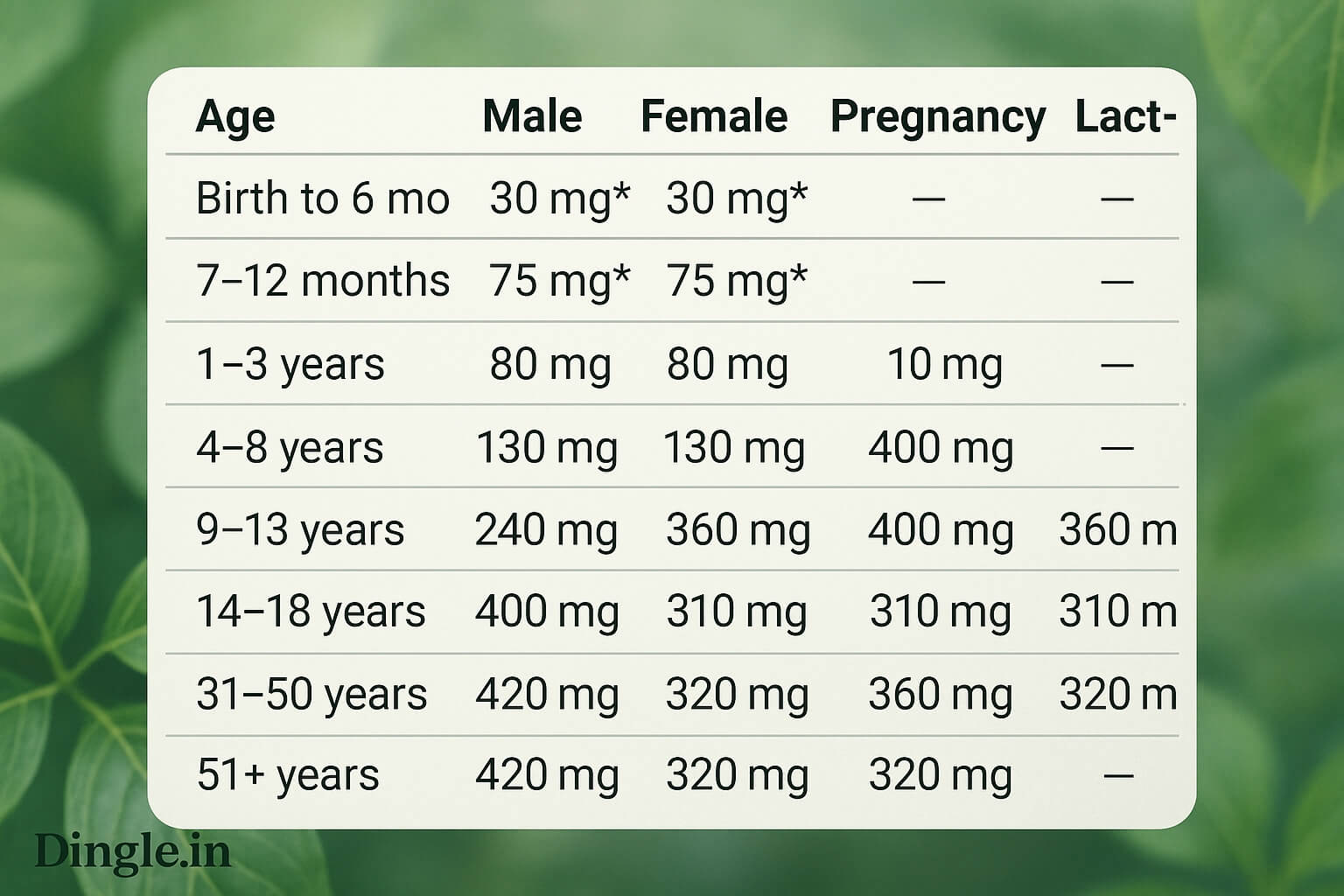In recent time, magnesium glycinate has become very popular for various benefits especially for good health and wellness. This magnesium glycinate is recommended in various lifestyle issues like stress, sleepless nights i.e. insomnia, muscle cramps, mood swings, inflammatory bowel disease (IBD), diabetes. It absorbs well in our body and does not give any digestive issues and complications.
For good heart health magnesium is essential.
Magnesium is a mineral. glycine is an amino acid. The combination of Magnesium mineral and glycine amino acid is called and known as Magnesium Glycinate. It is sold as a dietary supplement in online and offline local market of lifestyle wellness products.
Here you will know what is magnesium glycinate? Why suddenly it has become popular? What is magnesium glycinate benefits? Why is everyone talking about it? How can you actually benefit from it?

What is Magnesium Glycinate?
Magnesium helps our body regulate nerve and muscle function. Also, magnesium regulates blood sugar levels and inflammation. Magnesium plays important part in synthesis of protein, DNA and making of bone in our body.
Glycine is a non essential amino acid. It is found in high protein foods like meat and beans. Glycine has antioxidant properties. It is necessary for good mental health.
It is good to know that essentially magnesium needs to be combined with some other subtense to make it in a stable form. Therefore, magnesium is combined with glycine and that makes magnesium glycinate.
Magnesium glycinate, also known as magnesium diglycinate or magnesium bisglycinate. Compared with other form of magnesium, this type is good considering bioavailability. This means that our body can absorb and use most of it when provided.
Magnesium glycinate absorb in human body easily. This maximises magnesium benefits. This reduces side effects such as stomach discomfort.
What is bioavailability with reference to supplements
In the case of health supplements, bioavailability refers to the proportion of a nutrient that is taken up into the body’s circulatory system and made available for storage or utilization. This is very important because even when a supplement contains a high percentage of a nutrient, the body is able to absorb just some of it.
Bioavailability depends of various factors like, chemical nature of the nutrient, presence of other substances that enhance or increases absorption, and persons individual physiological state.
For example Vitamin C when consumed with plant foods, enhances iron absorption. Whereas substances such as phytates that is phytic acid found in certain plant foods prevent mineral absorption of fat soluble vitamins such as Vitamin D. More precisely for maximum benefits vitamin A, D, E, and K require dietary fats.
Therefore better bioavailability guarantees best results from health supplements.

What are different types of Magnesium ?
A “chelated form” refers to a mineral that is bound to an organic molecule, typically an amino acid, forming a stable complex called a chelate. This binding enhances the mineral’s absorption and utilization by the body, compared to non chelated forms.
For this reason, chelated form generally is easier on the stomach. That is chelated supplement is less likely to cause digestive disturbance like diarrhea. Magnesium glycinate is the most popular chelated form. It is excellent for insomnia (sleep deprivation) and anxiety relief. Another form magnesium malate is excellent for energy metabolism.
Overall, chelated magnesium offers a superior and body friendly way of getting your magnesium needs.
Magnesium citrate
When Magnesium is combined with citric acid, it is called Magnesium citrate. This is found in all kind of citrus fruits. This is most commonly available form of magnesium. This magnesium citrate is better bioavailable form. That is why it is easily absorbed in stomach digestive tract.
One thing is to be noted that it has natural laxative effect. Due to this higher doses of magnesium citate is used to treat constipation. It is available for the treatment of depression or anxiety, it is termed as calming agent. It is not well established, but sometimes magnesium citrate considered as a treatment of repeated migraine attacks.
Magnesium oxide
When Magnesium is combined with oxygen, it becomes magnesium oxide. It is white in colour and available in a powder form. Basically it is a salt.
If we consider bioavailability, magnesium oxide is absorbed poorly in our body.
For treatment of digestive issues, heartburn, indigestion, and constipation is used. In addition to being a magnesium supplement, magnesium oxide used as a laxative when quick bowel clearance is needed. This is required in special cases like before surgery or before medical exams.
Magnesium chloride
When Magnesium is combined with chlorine, it becomes magnesium chloride. It is a kind of salt.
It has a better bioavailability. This makes it a good magnesium supplement. For the treatment of low magnesium levels magnesium chloride is used.
It is widely available in all forms like capsule, tablet, and also in lotions and ointments. Majorly magnesium chloride is found in skin creams used to soothe and relax sore muscles.
Magnesium lactate
When Magnesium is combined with lactic acid, it becomes magnesium lactate. It is a kind of salt.
Magnesium lactate is very easy to digest. Therefore, for the magnesium deficiency treatment where large doses are suggested to patient, this form is recommended.
Magnesium lactate is a food additive added as an acidity regulator. To preserve and fortify foods and beverages items acidity regulators are added.
Magnesium malate
Some fruits contain malic acid which is a type of magnesium. It is specifically identified as magnesium malate.
This is naturally generated in foods like fruit and wine. By taste it is sour in taste. That is why food product manufacturers often add magnesium malate food products for flavour or acidity.
Magnesium malate is very easy to digest. Therefore, for the magnesium deficiency treatment where large doses are required to patient, this form is recommended.
Moreover, magnesium malate has a very least and mild laxative effect making it gentler to our body. People use it for treatment of fibromyalgia and chronic fatigue syndrome symptoms.
Magnesium taurate
This form of magnesium contains the amino acid taurine. That is why it is named magnesium taurate.
Magnesium with taurine is known to regulate blood sugar. It maintains blood sugar levels.
Magnesium and taurine help in maintaining healthy blood pressure.
A study on animal done in 2018, where rats with high levels of blood pressure were treated with magnesium taurate. This study concluded that intact of magnesium taurate significantly reduced blood pressure. This proved that magnesium taurate is beneficial to the heart health.
Magnesium L-threonate
When Magnesium is combined with threonic acid, it becomes magnesium L-threonate. It is a salt.
Threonic acid is a water soluble substance. It is made from the metabolic breakdown of vitamin C.
Magnesium L-threonate is easily absorbed in our body. For increasing magnesium concentrations in brain cells magnesium L-threonate is most effective. Therefore it is recommended in brain disorders treatment for depression, Alzheimer’s disease, and age related memory loss.
Magnesium sulfate
When Magnesium is combined with sulfur and oxygen, it becomes magnesium sulfate. It is identified as epsom salt. It looks like a white powder or table salt.
For treatment of constipation magnesium sulfate is used. Due to its bad taste, it is taken in capsule form.
In recent time, magnesium sulfate is added to bathwater for benefits in common ailments like muscles pain or inflammation. It is used as stress reliever and it soothes sore. We find magnesium sulfate in skin care products I form of lotion or body oil.

Benefits of Magnesium Glycinate
Magnesium glycinate is a very bioavailable form of magnesium that couples magnesium with the amino acid glycine. The pairing of magnesium and glycine increases absorption and reduces gastrointestinal side effects, which makes it a popular supplement to treat magnesium deficiency.
Magnesium Glycinate helps in treatment of mental health
Magnesium glycinate is commonly applied to relieve anxiety, depression, and stress symptoms. Its sedative effect comes from glycine, which functions as a relaxation-inducing neurotransmitter. More research is necessary, but existing studies indicate that magnesium supplementation might reduce depressive symptoms in adults with depressive disorders.
It helps to sleep
This supplement can improve sleep by inducing relaxation and the relaxation of muscle tension. Sleep disturbance in the majority of patients is caused by magnesium deficiency. Magnesium glycinate improves the cycles of restfulness in sleep.
A summary of 3 studies in elderly adults revealed that supplementation with 320 to 720 mg/day magnesium for as long as 8 weeks lowered their time to sleep and prolonged the total amount of sleep relative to placebo. Magnesium glycinate improves the cycles of restfulness in sleep.
Regulates Blood Sugar Levels
Magnesium has an essential function in the metabolism of glucose and insulin. Magnesium glycinate supplementation might enhance insulin sensitivity and normalize blood sugar levels in people with type 2 diabetes.
Lowers Blood Pressure
Daily consumption of magnesium glycinate has been linked with decreases in systolic and diastolic blood pressure, particularly in hypertensive patients. An analysis of studies linked supplementing with a dose of 300 mg or higher of magnesium per day for a duration of 12 weeks or longer with a decrease in systolic and diastolic blood pressure by 5.78 mm Hg and 2.5 mm Hg, respectively, in type 2 diabetes patients.
Improves Bone Health
Magnesium is necessary for bone growth and affects the action of osteoblasts and osteoclasts, the bone turnover cells. Proper intake of magnesium helps in maintaining bone density and keeps osteoporosis away.
Used in Migraine treatment
Magnesium deficiency is linked to an increased risk of migraines. Supplementing with magnesium glycinate may decrease the frequency and severity of migraine attacks. A daily dose of 400 to 600 mg has been found effective in some studies.
As per the two medical studies one in 2017 and other in 2019 magnesium supplements might be an effective and safe treatment to decrease the number of migraine attacks. Also it helped reduce the length migraine attacks.
Magnesium Improves Heart Health
Adequate magnesium levels are associated with a lower risk of heart disease. Magnesium helps maintain normal heart rhythms and prevents abnormal blood clotting, contributing to cardiovascular health. Magnesium Deficiency may cause irregular heartbeats, including atrial fibrillation and other arrhythmias.
Arrhythmias or irregular rhythms are rhythm or rate disorders of the heart. This refers to the heart beating too hard, too slow, or irregularly. The heart’s electrical system controls how hard to make the heart beat, and arrhythmias can result from complications with this system.
In congestive heart failure patients, magnesium supplementation was reported to enhance symptom relief and survival. Evidence has suggested that higher magnesium intake can be associated with lowered risks of coronary heart disease, sudden cardiac death, and heart failure.
Magnesium glycinate is best suited to improve sleep, reduce stress, relax muscles, and support mental health. Its high absorption and calming effects make it a favorite among health enthusiasts.

Magnesium glycinate helps reduce symptoms of PMS
Premenstrual syndrome (PMS) is a group of physical and emotional symptoms that a number of women have in the days before their menstrual period. Symptoms usually disappear after menstruation starts. Breast swelling, bloating, acne, headaches, joint or backache, constipation or diarrhea, food cravings are the PMS symptoms.
At an emotional level, women experience Irritability, mood swings, anxiety, depression, crying spells, concentration difficulties, sleep disturbances due to Premenstrual syndrome (PMS). Magnesium glycinate normalizes neurotransmitter such as serotonin and GABA.
Magnesium relaxes smooth muscles, such as the muscles of the uterus.
It can decrease the frequency and severity of uterine contractions. This helps easing out menstrual cramps. This effects reduces symptoms of Premenstrual syndrome (PMS).
Magnesium glycinate improves Exercise Performance
Magnesium is involved in energy metabolism and muscle contraction. Supplementation can enhance exercise performance by alleviating fatigue and muscle cramp. Magnesium is part of the mechanism by which food becomes energy, particularly with the activation of ATP, an essential muscle process. Through reduced muscle spasms and the enhancement of metabolism to produce energy, magnesium glycinate can help in the increased endurance and performance during exercising.
Magnesium Reduces Inflammation
Chronic inflammation is a known risk factor for many diseases like heart disease, diabetes, certain cancers, and Alzheimer’s disease. Magnesium, with its anti inflammatory properties, plays a role in managing it. Adequate magnesium intake may help reduce inflammation markers like C-reactive protein (CRP). Elevated levels of certain markers, like CRP, indicate inflammation in the body. Studies have shown that magnesium supplementation can lower CRP levels in individuals with chronic inflammation.
Supports Digestive Health
Unlike other types of magnesium that may produce digestive issues, magnesium glycinate is less likely to produce diarrhea or stomach cramps and can be used in people with sensitive stomachs.
Magnesium Improves Mind Power
Magnesium is important for nerve function, neuromuscular transmission, and cognitive processes such as learning and memory. It plays important role in the transmission of nerve impulses, muscle contraction, and the general health of the nervous system.
Magnesium’s effect on brain function also involves its ability to prevent neuronal cell death and its participation in the N-methyl-D-aspartate (NMDA) receptor, which is essential for learning, thinking, reasoning, remembering, imagining, learning words, using language and memory.
Magnesium is Important for Generation and DNA Repair
Magnesium is important for maintaining the integrity of DNA. Mg (Magnesium) ions bind to DNA and reduce the negative charge density. Thereby it stabilises the structure of DNA. Magnesium is also plays important part in operation of enzyme systems involving DNA repair such as nucleotide excision repair, base excision repair and mismatch repair.
Magnesium maintain the Immune system
For a healthy, strong immune system magnesium is essential. Magnesium affects immune cell function which includes T cells, macrophages, and natural killer cells. It maintains normal nerve and muscle function. Thus it supports a healthy immune system, and help in the production of energy and protein.
Deficiency of Magnesium may weakens and impair immune activity and this causes inflammation.
Magnesium is involved in modulating the inflammatory response by influencing the synthesis of inflammatory cytokines, which are immune system signaling molecules.
Magnesium helps in making Protein
More than 300 biochemical reactions in our body depends on magnesium. Magnesium takes part in various enzymatic reactions. This includes protein synthesis, to promote proper function. Magnesium participates in RNA synthesis and stabilization of ribosomes required for protein manufacturing.
Magnesium helps regulate levels of other electrolytes
Electrolytes are minerals present in our body fluids and blood. They carry an electric charge. Electrolytes are important for various functions in our body such as amount of water in body, blood pH level, various nerve function and muscle function.
Magnesium is involved in the active transport of electrolytes like calcium and potassium ions across cell membranes. This process is necessary for nerve impulse conduction, muscle contraction. Importantly this maintains normal heart rhythm.
Deficiency of magnesium can indeed lead to a various of issues in our body, this includes irregular heart rhythms (arrhythmias), muscle cramping, and even seizures.
How to Use Magnesium Glycinate Supplements
First, consult your physician or a medical health professional to include any supplement in your routine. They will tell you if magnesium is for you and give you the right dose and form based on your health.
When you first add magnesium, begin with a small amount of 100 to 200 mg a day. This permits your body to adjust slowly and minimizes the possibility of side effects. Slowly increase the dose, under the guidance of your doctor, depending on your body’s response, attempting to reach an optimum level.
Magnesium calms the nervous system and allows for deep, high quality sleep. Because of this, taking it at night ideally at least one hour before bedtime is especially helpful for those with a difficulty sleeping because of anxiety.
To get the best results, pair magnesium supplementation with good lifestyle habits, such as a healthy diet, stress relief through relaxation or mindfulness, and regular sleep schedule.
Listen closely to your body throughout your supplementation regimen. Notice changes in mood, gastrointestinal symptoms, sleep patterns, or energy levels. If you find that you have discomfort or side effects such as nausea or fatigue during the day cut back on the dose or change the timing.
By listening to how your body reacts and making thoughtful adjustments, you can get the most benefits from magnesium with minimal negative effects.
What happens if you take too much Magnesium?
The average adult contains about 22 to 26 grams of magnesium. About 60% of the total amount is reserved in bone, 39% is reserved intracellularly, and 1% only occurs in blood vessels in free or ionized active state.
Excess magnesium levels (hypermagnesemia) can be caused by excessive use of magnesium supplements. It can result in lethargy, gastrointestinal symptoms, hypotension, and cardiac arrest.

The body absorbs only as much as it requires, and the excess is excreted by the kidneys. Supraphysiologic amounts that is greater than normally present in the body in excess of 350 mg daily overloads this system. Nausea, diarrhea, and abdominal spasms are common in individuals. These symptoms occurs due to undigested magnesium in the intestines pulling water into the gut and activating bowel activity.
The U.S. National Academies Food and Nutrition Board recommends up to 350 mg per day of supplemental magnesium in adults to prevent side effects. The limitation does not hold for magnesium obtained through food, which hardly causes side effects in normal people.
Patients with kidney disease are at greater risk because their kidneys are not capable of removing excess magnesium from the body efficiently. In these situations, magnesium may accumulate in the blood, causing severe complications such as an abnormal heart rhythm or too low blood pressure.
To stay safe, follow dosing directions on supplements and talk to your doctor before taking an increased dose especially if you suffer from some health problems.
When you maintain the use of whole foods, the body can better utilize magnesium as well as limit its consumption naturally. Experts on health, like the National Institutes of Health (NIH), recommend taking in magnesium from foods rather than from supplements unless advised otherwise by a physician.
Risks of Taking Magnesium
Magnesium glycinate is safe for most individuals when taken in the suggested or recommended dose, but it is not risk free that you might need to know.
Magnesium interacts with some drugs, such as some antibiotics like tetracyclines and fluoroquinolones, and makes them ineffective. It will also interact with drugs used to treat high blood pressure, such as calcium channel blockers.
If you are on prescription medication, speak to your doctor before taking magnesium glycinate as a supplement to your regimen.
Those who have kidney disease must exercise greater caution since their bodies are unable to excrete excess magnesium, leading to harmful buildup.
Patients with cardiac problems must also consult a physician since abnormal levels of magnesium can have the potential to disrupt heart rhythm.
Side effects of magnesium glycinate overconsumption include diarrhea, nausea, and abdominal cramps. At its worst, overuse will lead to magnesium toxicity where a person suffers from low blood pressure, confusion, or irregular heartbeat.
Is it safe to take magnesium glycinate every day?
Magnesium glycinate is generally safe for daily dosing at therapeutic levels in most persona. Before taking magnesium glycinate, consult your doctor or medical practitioner. This is important if someone is already taking some medicine or have some or have pre existing illness.
Natural Sources of Magnesium
You may meet your daily magnesium need by including a variety of magnesium dense food in your daily meal.
Leafy vegetables like spinach provide approximately 157 mg of magnesium per cup when cooked and are one of the finest natural food sources.
Nuts, especially almonds and cashews, provide approximately 80 mg per ounce and serve as a handy and convenient snack. Seeds such as pumpkin and chia yield even more pumpkin seeds have about 150 mg of magnesium per 30Gm/ 1 Ounce serving.
Whole foods like brown rice and oats contribute around 40-50 mg per cooked cup, and quinoa contributes approximately 118 mg per cup.
Legumes like black beans, lentils, and chickpeas provide 60 to 120 mg of magnesium per cup, depending on type.
Dark chocolate even is a source; one 1-ounce serving of 70-85% dark chocolate contains approximately 64 mg of magnesium. These sources include other nutrients like fiber, iron, and antioxidants.
When you maintain the use of whole foods, the body can better utilize magnesium as well as limit its consumption naturally. Experts on health, like the National Institutes of Health (NIH), recommend taking in magnesium from foods rather than from supplements unless advised otherwise by a physician.

Comparing Magnesium Glycinate and Magnesium Citrate
Both of the types or forms of magnesium are good. But if you consider individual characteristics here are the important ones.
Magnesium Citrate is usually well tolerated and easiest to take against constipation. It’s easily absorbed by the body but brings on loose stools if too large a dose.
Magnesium Glycinate is also easily absorbed and less irritating to the stomach. It’s primarily for relaxation of muscles, promotion of sleep, and relief from anxiety. It won’t interrupt the digestive system.
If you want magnesium for relief from the digestion of the stomach, then citrate would be better. If you need to relax, sleep, or consume it daily for months, glycinate is generally best.

Final Thoughts
Magnesium Glycinate has many beneficial effects on sleep quality, stress levels, and both muscle and mental well being are supported by science studies. It’s no magic pill, but it can make a real difference when used in combined with a healthy lifestyle. Remember that moderation is key, begin with a low dose, gradually increase dose. Before that do consult your doctor to ensure Magnesium Glycinate is appropriate for your individual health needs.
Take care.

Идеальные источники бесперебойного питания для дома, в статье.
Рейтинг лучших ИБП, читайте.
Обзор функций источников бесперебойного питания, в этой статье.
Как выбрать ИБП для вашего оборудования, узнайте.
Все о ИБП, в нашем обзоре.
Покупка ИБП: на что обратить внимание, познакомьтесь.
Ваш идеальный ИБП, читайте.
Все о принципах работы источников бесперебойного питания, в нашем материале.
Как продлить срок службы источника бесперебойного питания, читайте.
Что нового в мире ИБП, посмотрите.
Правила подключения источника бесперебойного питания, на сайте.
Как выбрать ИБП для разных нужд, узнайте.
Инсайдерские советы по выбору источников бесперебойного питания, узнайте.
Все о различных типах источников бесперебойного питания, в гиде.
Пошаговая инструкция по установке ИБП, в нашем материале.
Обзор популярнейших источников бесперебойного питания, узнайте.
Как продлить срок службы ИБП, узнайте.
Как выбрать ИБП для игры, в нашем обзоре.
Что учесть при выборе источника бесперебойного питания, в нашем блоге.
УПС https://istochniki-bespereboynogo-pitaniya.ru .
Также рекомендую вам почитать по теме – https://mirka-master.ru.
И еще вот – https://ancientcivs.ru .
Your blog is a testament to your dedication to your craft. Your commitment to excellence is evident in every aspect of your writing. Thank you for being such a positive influence in the online community.
For the reason that the admin of this site is working, no uncertainty very quickly it will be renowned, due to its quality contents.
tfaota
Эффективное программирование контроллеров Siemens, для всех желающих.
Советы по программированию контроллеров Siemens, успешной разработки.
Как использовать TIA Portal для программирования, главные функции.
Ошибки при программировании контроллеров Siemens, возможные подводные камни.
Проектирование автоматизации с контроллерами Siemens, для эффективной работы.
Модели контроллеров Siemens и их особенности, для вашего проекта.
Лучшие языки программирования для контроллеров Siemens, для повышения эффективности.
Автоматизация процессов с контроллерами Siemens, примеры.
Современные тенденции в программировании контроллеров Siemens, в ближайшие годы.
Как разработать интерфейс для контроллера Siemens, для удобства использования.
Программирование контроллеров http://programmirovanie-kontroller.ru#Программирование-контроллеров – http://programmirovanie-kontroller.ru .